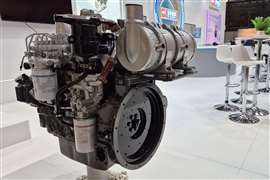Alfa Laval gets first approval in principle for firing boilers with methanol
07 December 2021
Pilot installation next
Maritime classification society the American Bureau of Shipping (ABS) has granted Alfa Laval the first marine approval for operating boilers on methanol.
Methanol, which is liquid at ambient temperatures and carbon-neutral if produced from green sources, is the next likely fuel step in decarbonizing the marine industry. While methanol can be found on a handful of vessels and is planned for many more, its use has so far been limited to main engines. In the future, methanol operations will need to extend to boilers, the company said.
“Alfa Laval is looking at the full scope of methanol’s influence on board,” said Lars Skytte Jørgensen, vice president Technology Development, Energy Systems, Alfa Laval Marine Division. “The most natural choice for boilers is to fire them with the vessel’s primary fuel, but methanol’s low-flashpoint nature and the differences in its energy density require a new approach to the burner and fuel supply systems. It was important for us to develop that approach, and we are proud to have it validated by ABS.”
Alfa Laval has been testing boiler operations with methanol since early 2021 at the Alfa Laval Test & Training Center, where engine combustion tests with methanol are also underway. Tests have been conducted using a pressure-atomizing MultiFlame burner on an Alfa Laval Aalborg OS-TCi boiler, as well as a methanol valve unit (MVU) designed by Alfa Laval to meet the class requirements from ABS.
Initial results, obtained with both pure methanol and a methanol-water mixture, showed as expected that methanol is easy to ignite and results in very low emissions, the company said. Focus was therefore placed on securing the same steam output with methanol – despite its lower heat value – as would be the case using oil or gas as fuel. A solution was reached after a few adaptations, ensuing that a boiler of a given size can produce the same amount of steam regardless which fuel is used. This meant that development could move rapidly to optimizing the fuel supply system and working with ABS on the methanol AIP, the company said.
With the AIP in hand, the next step for Alfa Laval will be a pilot installation on an oceangoing vessel. Results from field testing will be crucial in fine-tuning the methanol boiler solution and arriving at a commercial design.
Meanwhile, Alfa Laval said it is pursuing wider optimization possibilities that will compensate for methanol’s lower energy density and higher price. One of these is the use of an Alfa Laval Aalborg Micro economizer in conjunction with the OS-TCi. By absorbing waste heat from the boiler’s exhaust gas, the Aalborg Micro would recover valuable energy and reduce boiler-related fuel consumption by roughly 10%.
“Moving to methanol will require many changes on board, especially when it comes to energy management,” Jørgensen said. “The Aalborg Micro is a versatile boost in energy efficiency, suitable for the boiler and elsewhere. Together with other Alfa Laval solutions in development, it will help vessels fulfil energy needs while minimizing the methanol they consume.”
POWER SOURCING GUIDE
The trusted reference and buyer’s guide for 83 years
The original “desktop search engine,” guiding nearly 10,000 users in more than 90 countries it is the primary reference for specifications and details on all the components that go into engine systems.
Visit Now
STAY CONNECTED




Receive the information you need when you need it through our world-leading magazines, newsletters and daily briefings.
CONNECT WITH THE TEAM













